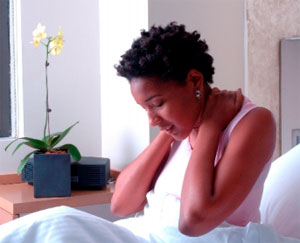Gaining Awareness
Goal
To be able to gain awareness about your sleep problems
Common Sleep Problems (Edinger & Carney, pp. 1-2)
Sleep problems vary from person to person but here are some common problems:
- Difficulty falling asleep at night
- Waking up during the night
- Waking up too early
- Having sleep that is poor in quality
- Daytime fatigue or sleepiness
- Concentration, attention, or memory problems
- Daytime irritability
- Worries about sleep difficulties or daytime symptoms
Causes of Sleep Problems (Edinger & Carney, p. 2)
 Stress is a common cause of sleep problems. Concerns about work, school, health, or family can keep your mind too active-resulting in difficulty relaxing. In the same way, anxiety can cause sleep disruptions. Severe anxiety is often best dealt with first before trying to tackle your sleep problems. The same is true if you are suffering from depression.
Stress is a common cause of sleep problems. Concerns about work, school, health, or family can keep your mind too active-resulting in difficulty relaxing. In the same way, anxiety can cause sleep disruptions. Severe anxiety is often best dealt with first before trying to tackle your sleep problems. The same is true if you are suffering from depression.
Medical conditions can also cause sleep problems, particularly those that cause physical pain like fibromyalgia and arthritis. Certain medications may interfere with sleep as well, such as some antidepressants, high blood pressure medications, and corticosteroid medications. Additionally, many over-the-counter medications-including some pain medication combinations, decongestants, and weight-loss products-contain caffeine and other stimulants that can interfere with getting a good night’s rest.
Assessing Sleep Problems Exercise (Edinger & Carney, p. 3-5)
Instructions: Some sleep problems are best treated by medical or medication treatment instead of or in addition to following the recommendations problems, answer these questions:
- Have you been told that you snore loudly?
- Do you sometimes awaken gasping for breath?
- Have you been told that you stop breathing during your sleep?
- Are you so sleepy in the daytime that you often tend to fall asleep when you are seated or become inactive?
- When you wake up in the morning do you still tend to feel tired and unrested?
- Do you often have a headache or dry mouth when you awaken in the morning?
If you answered “yes” to several of these questions, you would likely benefit from consulting with your healthcare provider and requesting a consultation with a sleep disorders specialist to determine if you have sleep apnea, a disorder categorized by repeated pauses in breathing during sleep.
- Do you often have an urge to move your legs?
- Is the urge to move your legs accompanied by an annoying sensation such as crawling, tingling, drawing, or general restlessness in your legs?
- Do these symptoms go away briefly if you move your legs or walk?
- Do the symptoms in your legs get worse when you are at rest?
- Do you tend to have the urge to move your legs or restless sensation more so in the late afternoon or evening hours?
- Do your restless symptoms make it difficult for you to fall asleep or stay asleep at night?
 If you answered “yes” to several of these questions, you would likely benefit from consulting with your healthcare provider to determine if you have restless legs syndrome and would benefit from medication. Restless legs syndrome is a neurological condition that is characterized by the irresistible urge to move the legs.
If you answered “yes” to several of these questions, you would likely benefit from consulting with your healthcare provider to determine if you have restless legs syndrome and would benefit from medication. Restless legs syndrome is a neurological condition that is characterized by the irresistible urge to move the legs.
- Do you have a medical condition such as arthritis, fibromyalgia, or a recent injury that causes you pain?
- Does the pain from this condition make it difficult for you to get to sleep at night or does it awaken you in the middle of the night?
- If you pain would go away, do you think that your sleep problem would be dramatically reduced or perhaps even eliminated?
If you answered “yes” to several of these questions, you likely have a painful medical condition that disrupts your sleep. It is recommended that you work with your physician to determine treatments that most effectively reduce or relieve your pain.
- Do you feel sad, blue, or depressed much of the time?
- Do you seem to have little energy and motivation to do what you need to do each day?
- Have you lost interest in socializing or engaging in your hobbies?
- Has your appetite changed or have you recently lost weight without trying to do so?
- Do you often have times during which you just want to retreat to your bed?
- Do you have periods of feeling unusually good or on top of the world for no reason?
- Do have periods when you seem to have an extremely high amount of energy such that you lose your interest in or need for sleep for several days at a time?
- Do you seem to worry about many things in addition to your sleep?
- Do you feel uptight, anxious, or stressed much of the time?
- Do you tend to have palpitations, excessive sweating, or shortness of breath when you are put under pressure or become the center of attention in a social situation?
If you answered “yes” to more than one of these questions, you would probably benefit from consulting with a mental health provider to determine if you have a mental or emotional health problem that would benefit from separate treatment attention.
Sleep Log (Edinger & Carney, p. 6-7)
 One of the best and most commonly used methods to assess and describe your sleep difficulty is by keeping records of your sleeping habits over an extended period of time. If you are collaborating with a healthcare provider, this can assist them in assessing your sleep difficulties. It can also help make you aware of important aspects of your sleep pattern that you may have ignored or not noticed. A sleep log tracks the following information:
One of the best and most commonly used methods to assess and describe your sleep difficulty is by keeping records of your sleeping habits over an extended period of time. If you are collaborating with a healthcare provider, this can assist them in assessing your sleep difficulties. It can also help make you aware of important aspects of your sleep pattern that you may have ignored or not noticed. A sleep log tracks the following information:
- Whether you took any naps the previous day
- Whether you used medication and/or alcohol to facilitate sleep
- The time you entered bed
- The time the lights were turned off and you attempted to fall asleep
- The number of minutes it took for you to fall asleep
- The number and length of awakenings during the night
- The time of the final morning awakening
- The time you actually got out of bed
- The quality of the previous night’s sleep
- Your level of restfulness upon awakening
Since many of these are related to your sleep and wake time at night, you may be tempted to take special note of your alarm clock each time you awaken or even to keep some records on your nightstand during the night. However, you should avoid giving in to those temptations because it may make your sleep problems worse. People with sleep problems usually do surprisingly well in estimating their sleep and wakefulness on the morning following each night’s sleep; thus, extra efforts to monitor your sleep during the night are not needed to produce a useful sleep log record.
Sleep Log Exercise (Edinger & Carney, p. 9)
Instructions: For the next two weeks, complete a sleep log using the below table as a guide:
| Days of the Week: | Mon | Tues | Wed | Thurs | Fri | Sat | Sun | |||||||||||||||||||||
|---|---|---|---|---|---|---|---|---|---|---|---|---|---|---|---|---|---|---|---|---|---|---|---|---|---|---|---|---|
| Calendar Date: | ||||||||||||||||||||||||||||
| Yesterday I napped from ____ to ____ (note time of all naps) | ||||||||||||||||||||||||||||
| Last night I took ___ mg of ___ or ___ of alcohol as a sleep aid (include all prescription and over-the-counter sleep aids) | ||||||||||||||||||||||||||||
| Last night I got in my bed at ___ (AM/PM) | ||||||||||||||||||||||||||||
| Last night I turned off the lights and attempted to fall asleep at ___ (AM/PM) | ||||||||||||||||||||||||||||
| After turning off the lights it took me about ___ minutes to fall asleep | ||||||||||||||||||||||||||||
| I woke from sleep ___ times (don’t count your final awakening) | ||||||||||||||||||||||||||||
| My awakenings lasted ___ minutes (list each awakening separately) | ||||||||||||||||||||||||||||
| Today I woke up for the day at ___ (AM/PM) | ||||||||||||||||||||||||||||
| Today I got out of bed for the day at ___ (AM/PM) | ||||||||||||||||||||||||||||
The quality of last night’s sleep was:
|
||||||||||||||||||||||||||||
I felt ____ rested upon arising today:
|
||||||||||||||||||||||||||||
Tip: Place your log somewhat convenient and complete it each morning within the first 30 minutes or so after waking up.
Next Step
Learn about using a mobile app as an alternative to a traditional sleep log by watching this video: